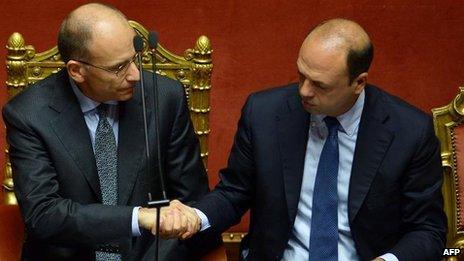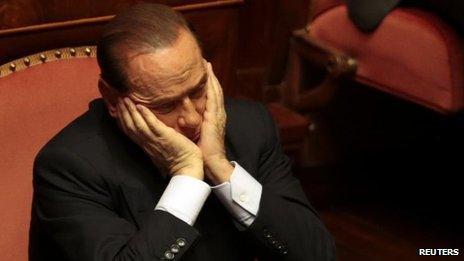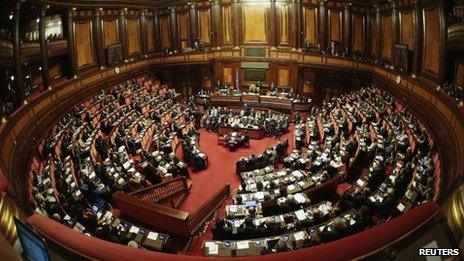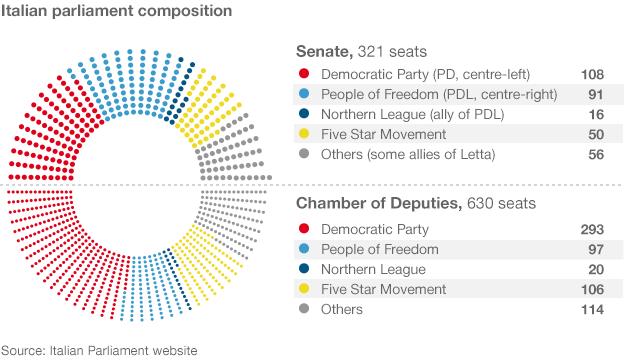Italy crisis: PM Enrico Letta faces confidence vote
- Published
The BBC's Alan Johnston reports: "When Silvio Berlusconi is in the thick of the drama, almost anything is possible"
Italy's Prime Minister Enrico Letta has been addressing parliament ahead of a crucial vote of confidence in his governing coalition.
Mr Letta told the Senate the collapse of his government could be fatal for the country.
The vote was called after Silvio Berlusconi ordered ministers in his centre-right People of Freedom party (PDL) to leave the government.
But some key PDL figures have defied him, saying they will back Mr Letta.
Mr Letta earlier rejected the resignations of the five PDL ministers.
Italian media now report that up to 25 PDL lawmakers will break away to vote with the government and also to form a new group.
'Moderate force'
Berlusconi, a former prime minister, has accused Mr Letta of allowing his "political assassination through judicial means" - a reference to Berlusconi's criminal conviction for tax fraud in August.
"Even though I understand the risks that I am taking on, I have decided to put an end to the Letta government," Berlusconi said in a letter to the weekly magazine Tempi.
However, he appeared more circumspect on arrival at the Senate on Wednesday, saying: "We'll see what happens. We'll listen to Letta's speech and then we'll decide."
Addressing the Senate, Mr Letta defended his government's performance and said Italy "runs a risk, a fatal risk" if it were to fall.
He said: "Give us your confidence to realise [our] objectives. Give us your confidence for all that has been accomplished... a confidence vote for Italy and Italians.''
In an apparent break with Berlusconi, his deputy and party secretary Angelino Alfano said PDL MPs should back Mr Letta in the confidence vote.
"I am firmly convinced that our party as a whole should vote confidence in Letta," said Mr Alfano, who is also Italy's interior minister.
The BBC's Alan Johnston, outside parliament, says the mood has been that the PM will get the support that he needs by finding enough dissidents in the Berlusconi ranks.
The first vote on Wednesday is in Senate and is expected in the early afternoon. This will be the crucial moment, as it is where Berlusconi's allies have a narrow majority. The chamber of deputies will vote later.
Mr Letta needs 161 votes in the Senate but can only count on the support of about 137 members, meaning he will need about 25 votes from others.
There had been rumours circulating that Berlusconi himself would change tack and support the government, but Italian media now say a majority of senators at a PDL gathering voted in favour of opposing the government and that this would represent the party line.
Mr Alfano's comments had caused the Italian stock market to jump on Tuesday as investors appeared increasingly confident that the government would not fall.
Carlo Giovanardi, a senator from Berlusconi's party, indicated he would support the government, adding: "We want to remain a moderate force."
Fabrizio Cicchitto, a PDL deputy, said: "Making the government fall would be a mistake."
Mr Cicchitto said any new government would be "hostile to the PDL" and would be a boon for Mr Letta's centre-left Democratic Party.

Enrico Letta in the Senate with the PDL's Angelino Alfano, whose comments raised the possibility of a victory for the PM

Berlusconi in the Senate. He said he would wait for Mr Letta's speech before deciding

Mr Letta needs 161 votes in the Senate but needs to overcome a majority for the PDL and its allies
On Tuesday, Mr Letta refused to accept the resignations of five ministers from the PDL, Italy's Ansa news agency reported, citing a government source.
Mr Letta called the vote of confidence after Berlusconi ordered his ministers to leave the government in protest at a rise in VAT (sales tax).
The prime minister accused Berlusconi of using the issue as an "alibi" for his own personal concerns.
Analysts say the crisis threatens to hamper badly needed reforms to tackle Italy's economic problems that include debt, recession and high youth unemployment.

The International Monetary Fund has warned that political tensions are a risk to the Italian economy.
Mr Letta's cross-party alliance was formed in April after two months of political deadlock following an inconclusive election.
Berlusconi dominated Italian politics for nearly two decades before resigning in November 2011, in the midst of a storm over the failing economy.